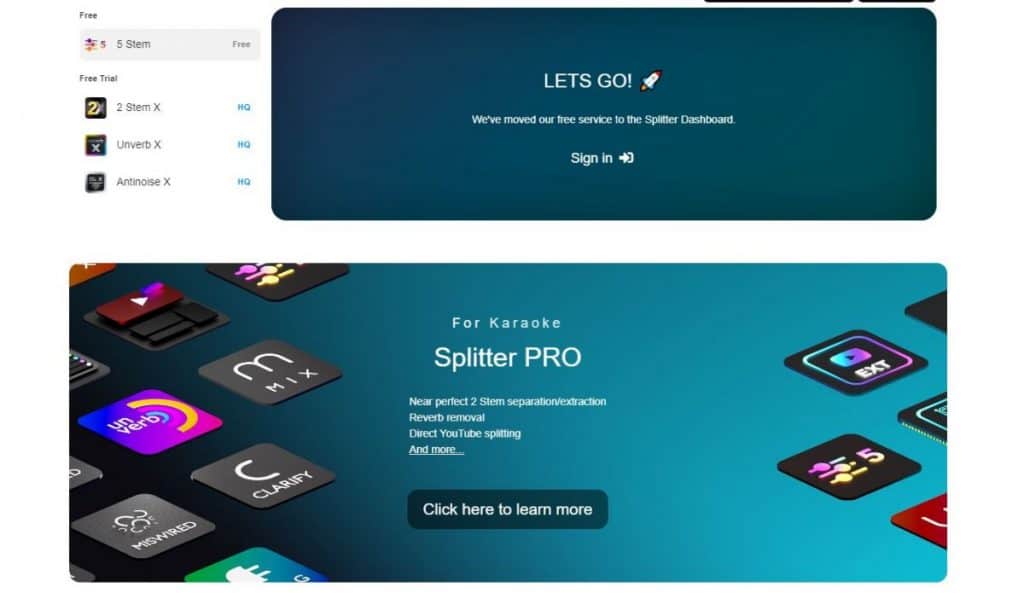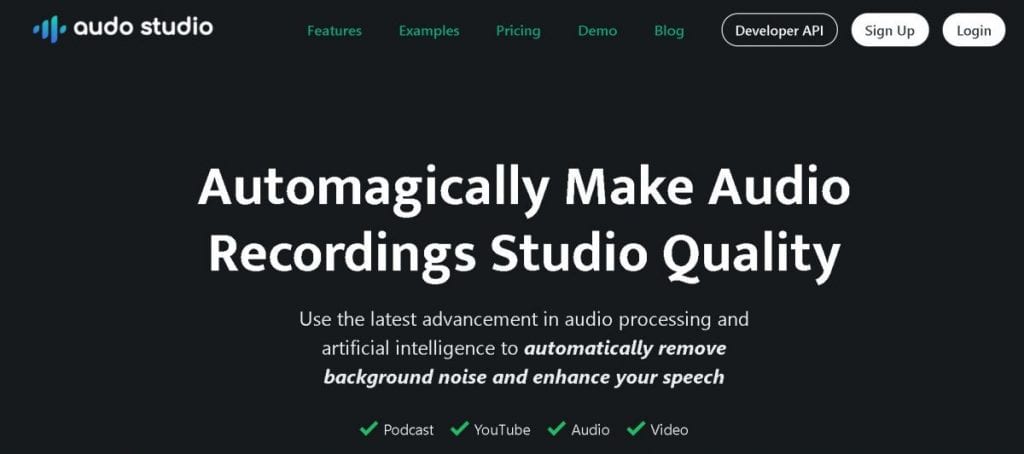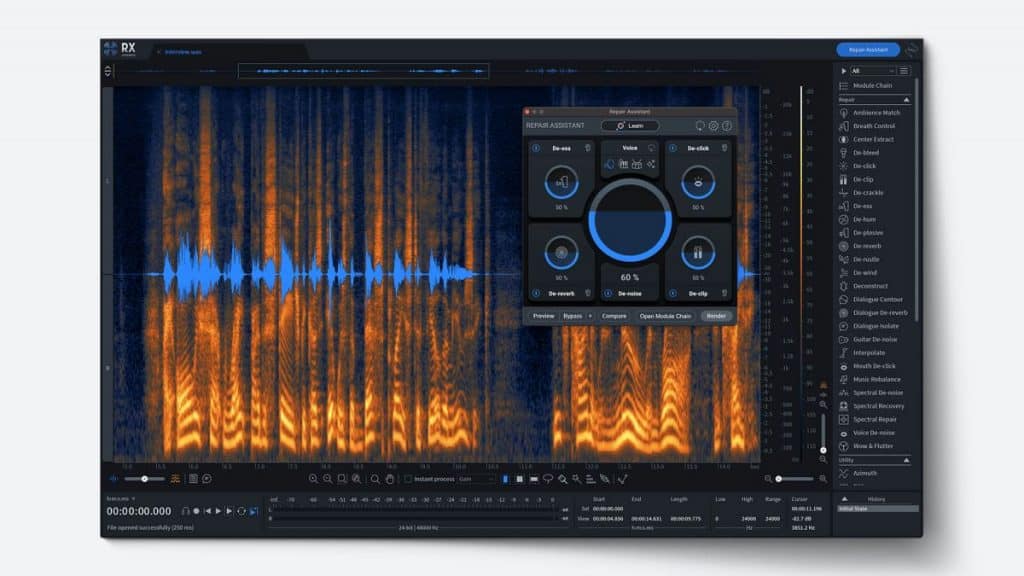10 Best AI Audio Editing Tools in 2023


These best AI audio editing tools are intelligent software programs used by sound engineers and music producers to enhance the creative process. These tools analyze large datasets and identify intricate patterns, making them popular among professionals. They generate melodies, harmonies, and improve sound quality, making them invaluable assets in the industry.
| Pro Tips |
|---|
| 1. Discover these 10 Best AI Tools for Instagram that help users save time, increase efficiency, and achieve better outcomes. |
| 2. Check out the 50 Best Text-to-Video AI Prompts that can help you create stunning visual content. |
| 3. Explore these 7 Free AI Image-to-Video Generators that can convert 2D to 3D in minutes. |

The Purpose of AI Audio Editing Tools
Vocal Tuning and Pitch Correction
Precision in vocal tuning and pitch correction has always been crucial in music production. Audio tools like the AI-assisted Auto-Tune Vocal Compressor have elevated this process by offering highly accurate and natural-sounding adjustments. These tools use machine learning to detect and correct pitch inaccuracies, enabling music producers to achieve polished vocals effortlessly.
Whether it’s a slight adjustment or a complete vocal transformation, AI audio tools can retain the emotional authenticity of the original recording. Furthermore, these tools are capable of enhancing its overall quality, ensuring that the final result is both technically impressive and emotionally resonant.
Music Composition and Generation
AI-driven music composition tools like OpenAI’s MuseNet have revolutionized how melodies and harmonies are crafted. These tools analyze a vast library of musical compositions, learning the intricate nuances of various genres and styles. As a result, they can generate original musical pieces tailored to the user’s preferences.
Music producers can quickly experiment with diverse musical ideas, saving time and inspiring creativity. These AI tools are like collaborative virtual bandmates, providing endless compositional possibilities that complement the producer’s vision.
Sound Design and Sampling
Sound designers often spend significant time searching for the right samples and creating unique sounds. AI audio tools like SpectraLayers use spectral analysis to deconstruct audio files into individual components, allowing sound designers to manipulate and modify specific elements.
This level of granularity opens up opportunities for creating entirely new sounds or refining existing ones. Additionally, AI-powered noise reduction tools enhance audio clarity by isolating and minimizing unwanted background noise, a valuable asset in producing professional-grade audio content.
Real-time Audio Processing and Mixing
AI audio tools are not confined to offline processing; they are making their way into real-time applications as well. Plugins like iZotope’s Neoverb use AI to analyze audio sources and automatically adjust reverb settings in real-time, creating a harmonious sonic space.
This real-time adaptability significantly speeds up the mixing process and provides instant feedback to music producers. Moreover, it enables them to make necessary adjustments to their audio arrangements, ensuring a seamless and efficient workflow.
10 Best AI Audio Editing Tools
1. LANDR
LANDR offers an impressive collection of 20 million mastered tracks, facilitating streamlined workflows through its intuitive interface.
As a trusted AI mastering tool, LANDR serves emerging artists, industry giants such as Warner Records, Def Jam, Atlantic, and top studio engineers that have mastered tracks for artists like Lady Gaga, Gwen Stefani, Snoop Dogg, Seal, Post Malone and more.
Both audio engineers and artists benefit from the tool’s user-friendly drag-and-drop interface for simplified audio mastering. LANDR stands out with its meticulously designed mastering chain, dedicated to optimizing creative output. Additionally, LANDR has exclusive, platform-specific mastering plugins that are not available elsewhere.
Pros:
- Unlimited online masters and revisions
- LANDR’s AI can analyze a reference track and apply its nuances to your music to achieve a similar sound.
Cons:
- The results you get from LANDR can vary depending on the track you upload.
2. Descript Studio Sound
Studio Sound is best AI audio editing tool with noise reduction and audio processing tool offered by Descript, a cloud-based media creation platform leveraging AI to help users create content faster. Descript has raised a total of $100M, primarily from OpenAI Startup Fund, Andreessen Horowitz, Redpoint Ventures, and Spark Capital.
Studio Sound isolates speakers’ voices, then regenerates and enhances the audio quality while removing echo and background noise. The tool’s regenerative algorithm improves voice quality and negates noisy environments.
Additionally, it enhances the user’s voice and removes background noise, room echo, and other sounds that distract from audio, videos, or screen recordings. Furthermore, this makes it a great tool for podcasters, YouTubers, and other content creators who want to save time and effort on their audio editing, allowing them to focus more on creating engaging content.
Pros:
- Access your project anywhere from the cloud.
- Collaborate with others on audio projects and make edits in real-time.
Cons:
- Descript is still under development, so it can be buggy sometimes.
3. Splitter

Splitter is a machine learning software that enables audio engineers to isolate instruments from music. The software offers four models to help audio professionals increase productivity. One notable example is the 5-stem model, which expertly extracts vocals, drums, piano, bass, and additional elements like guitar and synths. Similarly, the 2-stem model isolates the vocals and instrumental tracks.
The company focuses on building solutions that cater to music producers, DJs, artists, forensics engineers, audio engineers, karaoke enthusiasts, law enforcement personnel, scientists, and beyond. Splitter was founded by a highly accomplished music producer and audio engineer, who boasts extensive expertise across science, technology, and the music industry. Their musical contributions have graced the soundtracks of numerous Hollywood films, including notable titles like Fast & Furious 7, Men in Black: International, and the more recent Paws of Fury.
Pros:
- Supported on the cloud, PC, Mac, and mobile.
- Splitter’s advanced AI-driven technology excels in accurately isolating different elements within audio tracks, such as vocals, instruments, and more.
- Its tools can be applied across various industries and fields, from music production and DJing to forensic analysis, karaoke, and scientific research.
Cons:
- The advanced AI processing employed by Splitter.ai can be resource-intensive.
- There might be challenges in achieving the same level of separation quality in particularly complex or dense audio tracks
4. Sonible smart: EQ 3
Sonible’s smart: EQ3 is an AI-powered equalizer and best AI audio editing tool that uses an AI filter to automatically correct tonal imbalances. It cleans up unpleasant resonances and unwanted notches, to achieve a well-balanced sound.
Its Intelligent cross-channel processing helps users achieve a seamless arrangement of up to six channels, ensuring that each track fulfils its intended role. Through the analysis of spectral data from the grouped channels, the algorithms allocate space for every track within the mix. All users have to do is determine the sonic hierarchy based on their creative vision.
Pros:
- Sonible smart:EQ 3’s intelligent algorithms automatically identifies and corrects problematic frequency areas.
- The tool’s ability to analyze and adjust multiple frequency bands simultaneously saves valuable time during the mixing process.
Cons:
- Using the tool’s advanced features and functionalities might require a learning curve.
- The computational demands of Sonible smart:EQ 3’s sophisticated algorithms could strain system resources.
5. Orb Producer Suite 3
Developed by Hexachords, Orb Producer Suite 3 is one of the best AI audio editing tools developed by Hexachords, a Barcelona-based company that develops algorithms and AI tools for musicians, composers, music producers.
The suite comprises of four plugins. Orb Chords allows the generation of countless unique chord progressions, customizable with various attributes including color and dissonance. The Melody Maker plugin provides an endless array of melody ideas, accompanied by versatile controllers for achieving the perfect musical note.
The Bass module intelligently analyzes harmony and suggests optimal bass lines. In addition, the Arpeggio module offers instant and user-friendly access to a variety of arpeggio patterns, further enriched with extensive customization options. Together, these modules provide a comprehensive toolkit for musicians, empowering them to create intricate and captivating compositions.
Pros:
- Simple user interface with easy-to-use parameters.
- Works on all DAWs (except Protools), VST2/VST3 and AU/AUFX formats are provided.
- Drag and drop to import and export audio.
Cons:
- Pricier than other AI audio tools.
- New users may need to invest time in learning how to use all the functions in the suite.
6. Playbeat
Leveraging its exclusive AI SMART™ algorithm, Playbeat possesses the capability to instantly generate and propose a myriad of beat combinations. Employing sophisticated sonic analysis algorithms, this tool crafts entirely novel and non-repetitive grooves through advanced audio analysis techniques.
Furthermore, users have the option to train the application by exposing it to their daily audio inputs, enabling the app to learn their favored patterns.
This adaptive learning process results in the app generating personalized patterns that progressively align with the user’s preferred style, bringing the sound output ever closer to the user’s creative needs.
Pros:
- Playbeat users can create limitless rhythm variations.
- The generated rhythms can be easily integrated into various digital audio workstations (DAWs) and production environments.
- Send MIDI to any device, plugin or hardware.
Con:
- The accuracy of the AI-generated rhythms relies on the quality and diversity of the training data.
7. Lalal.ai
Built by a team of specialists in the fields of artificial intelligence, machine learning, mathematical optimization, and digital signal processing, Lalal.ai offers a Stem Splitter and Voice Cleaner.
Stem Splitter allows users to extract vocal, accompaniment, and various instruments from any audio and video. Moreover, Voice Cleaner provides AI-powered background music removal and noise cancellation technology. These two tools work in tandem to offer users a powerful suite of audio processing capabilities, enabling them to isolate specific elements and enhance the overall quality of their recordings.
These two tools are powered by AI models developed in-house. In 2020, the team developed a unique neural network called Rocknet using 20TB of training data to extract instrumentals and voice tracks from songs. A year later, they created Cassiopeia, a superior model to Rocknet that allowed improved splitting results with significantly fewer audio artifacts.
Pros:
- Its AI-powered vocal separation capabilities allow users to isolate vocals from mixed audio tracks with impressive accuracy.
- Automated vocal extraction eliminates the need for laborious manual editing.
Cons:
- The effectiveness of Lalal.ai’s vocal separation is influenced by the quality of the source audio.
- Can be expensive for those who need to process a high volume of audio.
8. Audo Studio

Driven by powerful AI algorithms, Audo Studio offers a suite of features that streamline tasks and enhance sound quality. From noise reduction and automatic equalization to advanced vocal processing, Audo Studio enables audio professionals, podcasters, musicians, and creators of all kinds to achieve pristine audio results without the complexities of traditional post-production methods.
Audo Studio’s AI algorithms analyze and intelligently reduce unwanted noise, enhancing clarity and ensuring a clean audio output. It automatically optimizes audio frequencies and refines vocals to enhance overall audio quality.
Pro:
- Audo Studio’s AI processing significantly improves audio quality.
Con:
- Has fewer features compared to other audio processing tools.
9. iZotope RX 10

iZotope RX 10 is an advanced audio restoration tool driven by AI and machine learning, designed to address an array of audio challenges, including noise, clipping, and distortion. This versatile tool encompasses a comprehensive range of features. Among them is the newly introduced Text Navigation function stands out, analyzing dialogue and providing synchronized text transcriptions above the spectrogram. This enables users to pinpoint desired words within an audio file and perform precise edits using the text interface.
The tool also incorporates Multiple Speaker Detection, a valuable feature that facilitates the identification and labeling of speech segments linked to individual voices. Furthermore, this proves particularly helpful when distinct speakers require tailored processing, allowing for more precise and targeted adjustments to be made for each speaker.
For newcomers, the Repair Assistant Plug-in is beneficial. Lleveraging machine learning to quickly detect and rectify audio issues directly within the digital audio workstation (DAW), this intuitive Assistant intelligently identifies specific problems and proposes customizable repair sequences, adjustable through user-friendly controls.
Pros:
- The tool is suitable for music production, post production and content creation.
- An array of features available to suit a wide range of audio processing needs.
Cons:
- Costly compared to other AI audio tools.
10. Krisp

Built upon the foundations of deep neural networks, Krisp’s AI technology works to enhance audio quality and intelligibility by filtering out unwanted sounds, resulting in more productive and focused conversations.
The AI-powered Voice Assistant includes a bi-directional Noise Cancellation feature that adeptly eradicates any ambient noise during calls. Additionally, operating both ways, this functionality effectively detects and removes noises and conversations originating from other participants on the call as well. As a result, the Voice Assistant ensures clear and uninterrupted communication, enhancing the overall call quality and user experience.
Its Echo Cancellation feature removes the echoes bouncing off of the walls or other hard surfaces in the room and even even takes care of that pesky echo problem, which results from an overly-sensitive microphone—or acoustic echo.
Pros:
- Krisp can be integrated across multiple applications including Zoom, Discord, Skype, Slack and many more.
- Pairs perfectly with any headset, microphone or speaker both on Mac and Windows desktop and laptop devices.
Cons:
- Can only be used for calls and meetings.
- The AI-powered processing can consume additional system resources, potentially impacting device performance.
- Krisp’s performance may vary based on network conditions, potentially affecting the real-time noise cancellation effectiveness during online calls.
10 Best AI Audio Editing Tools Cheatsheet
| Tool | Key Features | Pricing | Pros | Cons |
|---|---|---|---|---|
| LANDR | 20 million mastered tracks, AI mastering | $11.99/mo | Unlimited online masters and revisions | Results may vary based on the uploaded track |
| Descript Studio Sound | Noise reduction, audio enhancement | Free: $0 Creator: $12 Pro: $24 Enterprise: Custom | Real-time cloud collaboration, noise reduction | Still under development, occasional bugs |
| Splitter | Isolation of instruments, multiple models | Free | Wide range of applications, accurate isolation | Resource-intensive, complex tracks may pose challenges |
| Sonible smart: EQ 3 | AI-powered equalization, cross-channel processing | €79 one-time payment | Intelligent frequency correction, time-saving | Learning curve, resource demands |
| Orb Producer Suite 3 | AI-generated chord progressions, melodies, basslines | €99 one-time payment | User-friendly interface, versatile integration | Pricier option, learning curve for new users |
| Playbeat | AI-generated rhythm variations, adaptive learning | €69 for Windows and Mac €9.99 for iPad | Infinite rhythm exploration, integrated with DAWs | AI quality depends on training data diversity |
| Lalal.ai | Stem Splitter, Voice Cleaner | Lite pack:$15 one-time fee Pro pack: $35 (UP$70) one-time fee Plus pack: $25 one-time fee | Accurate vocal isolation, AI-powered processing | Source audio quality affects separation accuracy |
| Audo Studio | Noise reduction, automatic equalization | Starter: free Creator: $12/mo Pay as you go: $20 one-time payment for 600 minutes | Enhanced sound quality, user-friendly interface | Fewer features compared to some competitors |
| iZotope RX 10 | Audio restoration, Text Navigation, Speaker Detection | Standard: $399.00 one-time payment Advanced: $1,199 one-time payment | Advanced audio restoration, innovative features | Costly, complexity in some features |
| Krisp | Bi-directional noise cancellation | Free Pro: $8/mo Enterprise: Custom | Focused conversations, versatile integration | Limited to calls, resource usage, network dependency |
FAQs
Advanced machine learning algorithms, particularly deep neural networks, are used to analyze and manipulate audio data. These algorithms, trained on vast datasets, can recognize patterns, distinguish between audio elements, and make intelligent decisions about noise reduction, equalization, and other audio enhancements. By leveraging AI, these tools automate tasks, improving audio quality, removing unwanted noise, and enhancing sound clarity.
AI audio processing tools like Playbeat and Hexachords Orb are designed to inspire and complement musicians, providing new ideas and facilitating the creative process. These tools help jumpstart compositions, experiment with new directions, and overcome creative blocks. However, human creativity, emotion, and interpretation remain essential in music composition, allowing artists to infuse their unique perspectives and artistic intentions into their work.
Vocal separation accuracy depends on factors like track complexity, source material quality, and AI algorithms’ sophistication. While these tools can isolate vocals from mixed tracks, challenges may arise with heavily layered or intricate audio. Users should expect varying levels of accuracy and may need to fine-tune results, especially for unique or complex audio content.
This technology relies on deep learning algorithms that analyze large amounts of human speech data to learn the nuances of vocal patterns, intonation, and speech characteristics. By understanding the relationships between different phonemes and linguistic components, these tools can generate speech that closely resembles human speech. This technology offers creative possibilities for audio editing, voice manipulation, and even the generation of fictional character voices.
The use of AI audio processing tools raises ethical considerations, particularly in scenarios where generated content could be misused or misrepresented. For example, the ability to manipulate speech and audio could potentially lead to the creation of deepfakes or misleading content. It’s important for users to be mindful of how they apply these tools and to adhere to ethical guidelines that promote responsible and transparent use.
Conclusion
AI audio tools are revolutionizing the music industry by enhancing efficiency and creativity. They enable precision vocal tuning, AI-assisted composition, sound design, and real-time mixing. This synergy between human creativity and AI’s technological capabilities allows musicians to unlock new artistic expression and elevate their audio production.
Read more about AI:
Disclaimer
In line with the Trust Project guidelines, please note that the information provided on this page is not intended to be and should not be interpreted as legal, tax, investment, financial, or any other form of advice. It is important to only invest what you can afford to lose and to seek independent financial advice if you have any doubts. For further information, we suggest referring to the terms and conditions as well as the help and support pages provided by the issuer or advertiser. MetaversePost is committed to accurate, unbiased reporting, but market conditions are subject to change without notice.
About The Author
Cindy is a journalist at Metaverse Post, covering topics related to web3, NFT, metaverse and AI, with a focus on interviews with Web3 industry players. She has spoken to over 30 C-level execs and counting, bringing their valuable insights to readers. Originally from Singapore, Cindy is now based in Tbilisi, Georgia. She holds a Bachelor's degree in Communications & Media Studies from the University of South Australia and has a decade of experience in journalism and writing. Get in touch with her via [email protected] with press pitches, announcements and interview opportunities.
More articles

Cindy is a journalist at Metaverse Post, covering topics related to web3, NFT, metaverse and AI, with a focus on interviews with Web3 industry players. She has spoken to over 30 C-level execs and counting, bringing their valuable insights to readers. Originally from Singapore, Cindy is now based in Tbilisi, Georgia. She holds a Bachelor's degree in Communications & Media Studies from the University of South Australia and has a decade of experience in journalism and writing. Get in touch with her via [email protected] with press pitches, announcements and interview opportunities.


















































